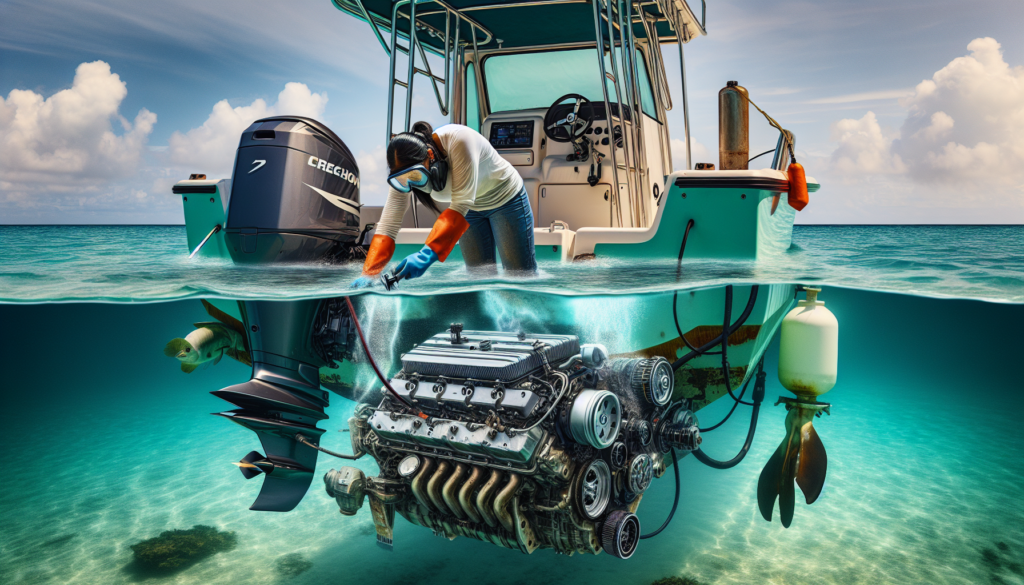Embarking on a boating adventure should come with the responsibility of ensuring our seas remain clean and healthy. “Top Ways To Prevent Oil And Fuel Spills From Boat Engines” offers practical steps and easy-to-implement practices to avoid marine pollution while enjoying your seafaring endeavors. It’s something every boat owner should read and understand, not just to avoid potential fines, but to contribute to the preservation of our marine ecosystems as well. This guide contains effective strategies and preventive measures to ensure your boat engine doesn’t add to the alarming amount of pollution in our oceans.

Understanding The Impact of Oil and Fuel Spills
Oil and fuel spills represent a significant burden on both the environment and the economy. Being mindful of these impacts is the first step in understanding the importance of preventing such damaging occurrences.
Ecological consequences of spills
From an ecological perspective, the spills pose severe problems. The release of oil and fuel into water bodies affects both the water quality and the life thriving in it. Many marine species suffer or perish due to the pollution created by the spills. Moreover, the spills can disrupt the sensitive balance of ecosystems by causing the death of key species in the food chain, which in turn can have cascading effects on the overall habitat.
Financial implications of spills
The financial implications associated with oil and fuel spills are immense. They can lead to substantial cleanup costs that include rehabilitation of the affected marine life and ecosystems. Delays or disruptions in activities such as tourism and fishing, owing to a spillage incident, can further result in significant loss of revenue. Moreover, boat owners might have to face damaging lawsuits and hefty penalties for causing the spill.
Safety hazards associated with spills
Oil and fuel spills are not just about environmental and financial damage. They also pose a considerable safety risk. Spilled oil or fuel can potentially lead to fires or explosions, putting lives at risk. Moreover, spills create slippery surfaces that can lead to falls and injuries. It’s evident that prevention is a much preferable route than tackling the aftermath.
Awareness of Boat Engine Design and Operation
A good understanding of your boat’s engine design and operation is crucial in preventing spills.
General functioning of boat engines
A boat engine operates much like a car engine. It draws fuel from a tank, which is then combusted in the engine’s cylinders to provide the power needed to propel the boat. The engine oil ensures smooth operation by reducing friction among the moving parts.
Common reasons for oil and fuel leaks
Fuel and oil leaks often occur due to faulty connections, deteriorated seals, and improper installation of parts. Surprisingly, poor maintenance practices and negligence are also major contributors to leaks.
Important engine components prone to leaks
The most common parts of a boat engine prone to leaks include the fuel tank, fuel lines, connections, various seals, and the oil filter. Regular checks and maintenance of these components can significantly lower the risk of spills.

Regular Inspection and Maintenance
Proactive inspection and maintenance is a surefire way to reduce the chances of spillage.
Scheduling routine check-ups
Make it a practice to routinely check your boat for signs of potential leaks. Keep an eye out for any oil sheen in the water, an unusual smell of fuel, or unexplainable drops in fuel or oil level.
Carrying out a comprehensive inspection of the engine
A comprehensive inspection involves checking the fuel and oil lines, engine seals, oil filter, and connections, among other things. Look out for signs of damage, wear and tear, corrosion, or any loose components.
Timely maintenance of damaged parts
Finding a problem early will not serve any purpose unless you fix it promptly. Regularly review your boat’s maintenance records and schedule repairs or replacements of any faulty parts as soon as possible.
Installation of Automatic Shut-Off Valves
Automatic shut-off valves are essential safety devices in preventing spills.
Functioning and benefits of shut-off valves
These valves function by automatically shutting off the flow of fuel when a specific pressure level or flow rate is reached. This significantly reduces the risk of overfilling or leaks.
Choosing the right automatic shut-off valve
Numerous automatic shut-off valves are available in the market. Ensure to choose one that fits your boat’s engine type and size, and meets all safety codes and standards.
Correct installation and maintenance of the valve
The valve must be correctly installed, preferably by a professional, to function effectively. Regular maintenance and checks are also important for ensuring its optimum performance.

Securing Fuel Lines and Connections
Ensuring secure fuel lines and connections is another way to ward off potential spills.
Identifying vulnerable spots in the fuel system
Regular inspections can help identify vulnerable spots in the fuel system. These often include areas where the lines connect to the engine or where aging and fraying have occurred.
Proper installation of fuel lines
Improperly installed fuel lines can easily lead to leaks. Seek professional help if needed to ensure the lines are correctly fitted and secured.
Essential tools and techniques to secure connections
Using the right tools and following correct techniques can also make a big difference. It might be beneficial to learn about different types of clamps and connectors, along with the correct methods of fixing and tightening them.
Properly Sealing and Insulating Engine Components
Sealing and insulating your engine components is another effective measure to prevent leaks.
Importance of sealing in preventing leaks
Seals prevent oil and fuel from seeping out of the engine. Worn or broken seals are often the main cause of leaks. Therefore, ensuring a good seal is paramount to leak prevention.
Types of sealants
Several types of sealants are available, but not all are suitable for use in boat engines. Use marine-grade sealants that can withstand the rigors of the harsh marine environment.
Integration of insulation materials for further safety
For an added layer of protection, consider integrating insulation materials into your engine setup. These materials can act as a barrier, preventing any small leaks from turning into significant spills.

Use of Drip Pans and Absorbent Pads
Even with all the precautions, small leaks may occur. This is where drip pans and absorbent pads come in.
Working and importance of drip pans
Drip pans are placed below the engine to catch any oil or fuel that may leak. Regularly checking and emptying these pans can help prevent the build-up of leaked oil or fuel, thereby reducing the risk of a spill.
Selecting suitable absorbent pads
Absorbent pads are designed to absorb oil and fuel while repelling water, making them ideal for use in boats. Choose pads that suit the size of your engine and have high absorbency.
Correct placement and routine check of pans and pads
Place the pans and pads in the right location – directly under potential leak points. Furthermore, ensure to check them frequently and replace them when they become saturated.
Good Fueling Practices
Proper fueling can also make a significant difference in preventing spills.
Correct techniques of fueling boats
Fuel your boat slowly and attentively, avoiding rushing that could result in overfilling or spilling.
Avoiding overfueling
Be mindful to leave some room in your fuel tank for the fuel to expand as temperatures increase to avoid overflows.
Steps to take in case of an accidental spill during fueling
If a spill does occur during fueling, stop fueling immediately. Clean up the spill using absorbent pads or rags and notify the marina staff if you’re at a public dock.
Emergency Spill Response Planning
Nobody wants a spill to occur, but being prepared for such incidents is important.
Importance of having a spill response plan
A well-thought-out plan can guide you and your crew in taking the right action to contain a spill, mitigate its effects, and comply with reporting requirements.
Appropriate actions to take in case of a spill
Depending on the size and location of the spill, actions may involve immediate efforts to contain the spill, alerting relevant authorities, and initiating cleanup operations.
Training crew members on emergency procedures
Make sure everyone on your boat is familiar with emergency procedures and understands their roles. Training sessions and drills can be an excellent way to ensure this.
Proper Storage and Disposal of Used Oil and Fuel
Lastly, the proper disposal of used oil and fuel is crucial to preventing spills and protecting our environment.
Safe storage methods for used oil
Store used oil in tightly sealed containers and keep them in a cool, dry place. Avoid placing the containers where they might tip over or get damaged.
Legal regulations for disposal of oil and fuel
Various regulations dictate how and where used oil and fuel should be disposed of. Make sure you are aware of and comply with these rules.
Recycling and environment-friendly disposal methods
Finally, explore environment-friendly disposal methods. Many marinas and service stations have facilities for recycling used oil and fuel, turn to these options whenever possible.
By thoroughly understanding your boat’s engine operation and diligently following these precautionary measures, you can indeed prevent oil and fuel spills, thereby protecting the environment, minimizing financial costs, and ensuring safety on board.

